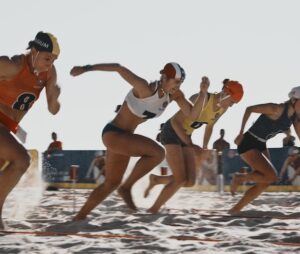
Story by Bernard Little
Walter Reed National Military Medical Center
U.S. Army 2nd Lt. Sophia Gulotti graduated from the Clinical Nurse Transition Program (CNTP) at Walter Reed on Oct. 4, gaining greater knowledge as a medical-surgical nurse while providing care to Military Health System (MHS) beneficiaries and working alongside more experienced nurses as mentors.
Gulotti is now a clinical staff nurse on 4 East, putting into practice those skills she learned in the CNTP, including clinical decision-making, organization, critical thinking, communication, time management, leadership, and prioritization of patient care.
“Becoming an Army nurse is something I decided to embark on my senior year of high school,” said Gulotti, who was born in Washington, D.C., but grew up in Wilmington, Delaware. “I knew I wanted an exciting career that would challenge me and allow me to travel, so I applied for the Army four-year ROTC scholarship with a major in nursing,” said the Class of 2023 Temple University nursing graduate.
While at Temple, Gulotti was one of only two of Temple University’s women student-athlete Army ROTC cadets. She competed on the indoor and outdoor track and field teams in the heptathlon, an event that consists of seven different track and field disciplines, including the 100-meter hurdles, high jump, shot put, 200-meter dash, long jump, javelin and 800-meter run. This while balancing classes, homework, practices, travel for competitions, and the physical and classroom demands of ROTC, including strength and conditioning drills and military studies.
“Once I enrolled in ROTC, I knew I made the right choice because I enjoyed the regimental routine that the military is structured on, and the camaraderie I felt with the other cadets,” Gulotti shared.
Since graduating from Temple, Gulotti has continued to take on challenges and excel. This summer, she competed on Team USA in the 2024 International Life Saving Federation World Championships in Australia. Twelve elite surf-lifesaving athletes were selected to represent the United States, six men and six women, who proved themselves to be the best of the best in the U.S.
“Surf lifesaving is a sport that combines competitive surf events with voluntary lifeguard services,” Gulotti explained. “It originated in Australia in the early 20th century and involves a combination of swimming, board riding, surf skiing, mock rescue tasks using surf boats, surf boat racing, and sand running. I specialize in the running events, so while in Australia I competed in the beach sprint, relays, and an elimination race called beach flags.”
She explained that the Taplin relay is a four-person team event that includes one athlete for each water leg, plus one beach sprinter. “The athletes must race around the buoys out in the water, and back to shore before tagging their teammate who completes the next leg. The mixed ocean-person relay is a coed Taplin relay event with a larger course.”
“Team USA was sixth in ocean events and 10th overall combined with pool and ocean events out of 44 countries. This is the best the United States has done since 2010, when there were 33 countries competing, making this championship one to remember,” stated U.S. Army Lt. Col. Mike Brown III, Department Chief of Medical-Surgical Nursing at Walter Reed.
Gulotti placed fourth in the mixed ocean-person relay; fifth in the women’s Taplin relay; fifth in the interclub 4 x 90-meters beach relay; sixth in the open 90-meters beach sprint; and ninth in the open beach flags.
“I originally got involved with the United States Lifesaving Association (USLA) and Surf-Lifesaving in the summer of 2020,” Gulotti shared. “My first season of Division 1 track and field had been cancelled due to the pandemic, so once summer rolled around, I shifted my focus to lifeguard training. Taking up a sport in the summer was a way for me to stay in shape for college athletics,” she added.
“I enjoy competing in surf lifesaving for many reasons, but I love the fact that I have been able to travel around the globe and meet world class athletes from all over. I now have friends who I have met through the sport from Japan, Australia, New Zealand, South Africa and Canada. When it’s race day, we are each other’s competition, but when it’s over, we are friends, [and] that’s the best part of athletics.”
“I also love that I can continue athletics at an elite level beyond college,” Gulotti added. “It gives me an opportunity to work towards my goals outside of the Army and is an outlet to showcase my athleticism and competitive side.”
Gulotti said her love of the sport also carries over into her Army career, and not only in keeping her fit to serve.
“Training is intense and happens year-round,” she shared. “In the off-season, I focus on getting stronger in the weight room paired with running. In the spring, I primarily do track-based sprint sessions to get ready for the season. During the summer, most of my training is done on the beach to prepare for competitions.
“Competing in surf lifesaving competitions provides many transferable skills to the Army nursing fields,” Gulotti continued. “For example, teamwork is required in both. Surf lifesaving fosters communication and collaboration, just like working on a health-care team. Consistent training and exercise help me beyond athletics into the hospital setting, as patient care is physically demanding, and 12-hour shifts can be taxing. Surf lifesaving also fosters resiliency and adaptability. These skills further develop mental toughness, offsetting the emotional demands of patient care. Elite competition training makes me a better nurse because it requires self-motivation, good time management skills and discipline.”
“There’s a lot of pressure that comes with being a nurse, [and] it’s challenging to always be on your A-game, [but] I love that I work to heal our nation’s warriors and conserve the fighting strength of our service members. I love that I get to work in an environment with other like-minded individuals who get to care and make people feel better,” Gulotti said.